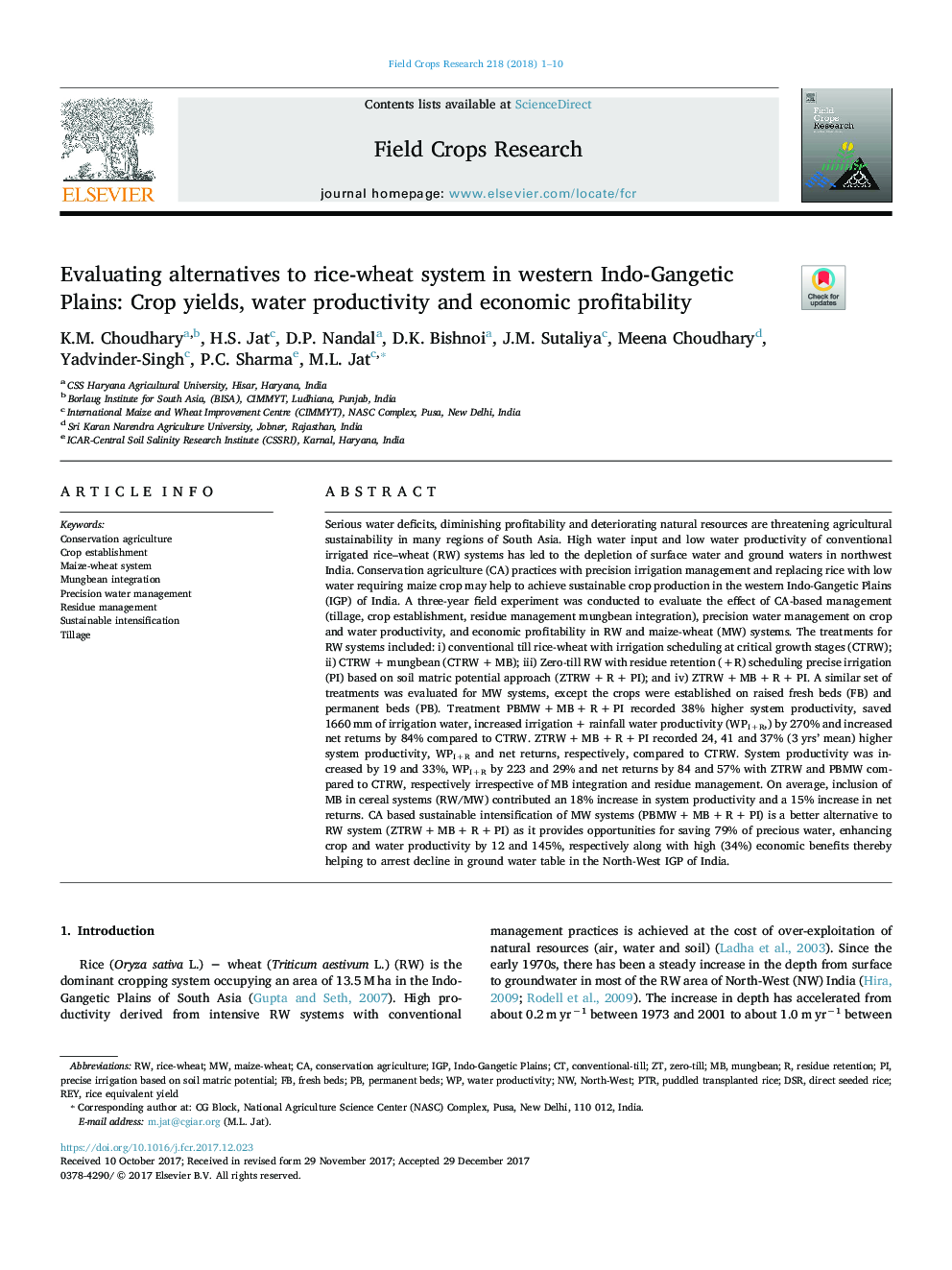| Article ID | Journal | Published Year | Pages | File Type |
|---|---|---|---|---|
| 8879341 | Field Crops Research | 2018 | 10 Pages |
Abstract
Serious water deficits, diminishing profitability and deteriorating natural resources are threatening agricultural sustainability in many regions of South Asia. High water input and low water productivity of conventional irrigated rice-wheat (RW) systems has led to the depletion of surface water and ground waters in northwest India. Conservation agriculture (CA) practices with precision irrigation management and replacing rice with low water requiring maize crop may help to achieve sustainable crop production in the western Indo-Gangetic Plains (IGP) of India. A three-year field experiment was conducted to evaluate the effect of CA-based management (tillage, crop establishment, residue management mungbean integration), precision water management on crop and water productivity, and economic profitability in RW and maize-wheat (MW) systems. The treatments for RW systems included: i) conventional till rice-wheat with irrigation scheduling at critical growth stages (CTRW); ii) CTRWâ¯+â¯mungbean (CTRWâ¯+â¯MB); iii) Zero-till RW with residue retention (+R) scheduling precise irrigation (PI) based on soil matric potential approach (ZTRWâ¯+â¯Râ¯+â¯PI); and iv) ZTRWâ¯+â¯MBâ¯+â¯Râ¯+â¯PI. A similar set of treatments was evaluated for MW systems, except the crops were established on raised fresh beds (FB) and permanent beds (PB). Treatment PBMWâ¯+â¯MBâ¯+â¯Râ¯+â¯PI recorded 38% higher system productivity, saved 1660â¯mm of irrigation water, increased irrigationâ¯+â¯rainfall water productivity (WPI+R,) by 270% and increased net returns by 84% compared to CTRW. ZTRWâ¯+â¯MBâ¯+â¯Râ¯+â¯PI recorded 24, 41 and 37% (3 yrs' mean) higher system productivity, WPI+R and net returns, respectively, compared to CTRW. System productivity was increased by 19 and 33%, WPI+R by 223 and 29% and net returns by 84 and 57% with ZTRW and PBMW compared to CTRW, respectively irrespective of MB integration and residue management. On average, inclusion of MB in cereal systems (RW/MW) contributed an 18% increase in system productivity and a 15% increase in net returns. CA based sustainable intensification of MW systems (PBMWâ¯+â¯MBâ¯+â¯Râ¯+â¯PI) is a better alternative to RW system (ZTRWâ¯+â¯MBâ¯+â¯Râ¯+â¯PI) as it provides opportunities for saving 79% of precious water, enhancing crop and water productivity by 12 and 145%, respectively along with high (34%) economic benefits thereby helping to arrest decline in ground water table in the North-West IGP of India.
Keywords
Related Topics
Life Sciences
Agricultural and Biological Sciences
Agronomy and Crop Science
Authors
K.M. Choudhary, H.S. Jat, D.P. Nandal, D.K. Bishnoi, J.M. Sutaliya, Meena Choudhary, Yadvinder-Singh Yadvinder-Singh, P.C. Sharma, M.L. Jat,
